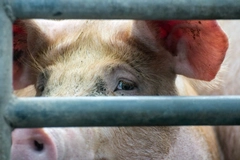
- Industry news
Industry news
- Category news
Category news
- Reports
- Key trends
- Multimedia
- Journal
- Events
- Suppliers
- Home
- Industry news
Industry news
- Category news
Category news
- Reports
- Key trends
- Multimedia
- Events
- Suppliers
FDA Warns 17 US Companies Over Labelling Violations

The violations cited in the warning letters include unauthorized health claims, unauthorized nutrient content claims, and the unauthorized use of terms such as “healthy,” and others that have strict, regulatory definitions.

4 Mar 2010 --- The U.S. Food and Drug Administration has notified 17 food manufacturers that the labeling for 22 of their food products violates the Federal Food, Drug, and Cosmetic Act.
The action follows an October 2009 statement by Commissioner of Food and Drugs Margaret Hamburg, M.D., encouraging companies to review their labeling to ensure that they were in compliance with FDA regulations, and were truthful and not misleading.
In an open letter to Industry dated March 3, 2010, Dr. Hamburg underscored the importance of providing nutrition information that consumers could rely on.
"Today, ready access to reliable information about the calorie and nutrient content of food is even more important, given the prevalence of obesity and diet-related diseases in the United States," Dr. Hamburg said in the letter. She also expressed her hope that the warning letters would clarify the FDA’s expectations for food manufacturers as they review their current labeling.
The violations cited in the warning letters include unauthorized health claims, unauthorized nutrient content claims, and the unauthorized use of terms such as “healthy,” and others that have strict, regulatory definitions.
Companies that received warning letters have 15 business days to inform the FDA of the steps they will take to correct their labeling.
Dr. Hamburg has made nutrition labeling a priority for the FDA. The warning letters are the agency’s most recent action to help improve consumers’ ability to make nutritious choices. The FDA soon will propose guidance regarding calorie and nutrient labeling on the front of food packages and plans to work collaboratively with the food industry to design and implement innovative approaches to front-of-package labeling that can help consumers choose healthy diets.
For example in the case of a letter to Nestle USA for their several Nestle Juicy Juice products: Juicy Juice Brain Development Fruit Juice Beverage (Apple), Juicy Juice All-Natural 100% Juice Orange Tangerine, and Juicy Juice All-Natural 100% Juice Grape, the FDA wrote the following:
“Your Juicy Juice Brain Development Fruit Juice Beverage product is misbranded within the meaning of section 403(r) of the Act [21 USC 343(r)] because its labeling includes unauthorized nutrient content claims. Except for statements that describe the percentage of a vitamin or mineral in relation to a Reference Daily Intake (RDI), a nutrient content claim cannot be made for a food intended for use by infants and children less than 2 years of age unless the claim is specifically provided for in parts 101, 105, or 107 of FDA regulations. 21 CFR 101.13(b)(3). This product is marketed specifically for children under two years of age, as indicated by the claim "Helps support brain development***In children under two years old," which appears on the product label. The label also bears the nutrient content claim "no sugar added." The circumstances under which a "no sugar added" claim is permitted are defined in 21 CFR 101.60(c). That regulation does not allow the claim for conventional food products intended for use in children under age 2. 21 CFR 101.60(c)(4). Therefore, the claim "no sugar added" misbrands your product.”
The companies and products that have received warning letters are
• Dreyers Grand Ice Cream, Inc. Nestle Drumstick Classic Vanilla Fudge Dreyers Dibs Bite Sized Ice Cream Snacks and Vanilla Ice Cream with Nestle Crunch Coating
• Gorton's, Inc. Gorton's Fish Fillets
• Schwan's Consumer Brands Mrs. Smith's Coconut Custard Pie
• Spectrum Organic Products, Inc. Organic All Vegetable Shortening
• Beech-nut Beechnut DHA Plus line of products Beechnut Whole Grain Oatmeal with mixed fruit
• PBM Products Parent's Choice Little Puffs Plus Calcium Blueberry Naturally Flavored Parent's Choice Little Puffs Made with Whole Grains Peach-Mango Naturally Flavored
• Nestle Juicy Juice Brain Development Fruit Juice Beverage (Apple) Juicy Juice All-Natural 100% Juice Orange Tangerine and Juicy Juice All-Natural 100% Juice Grape
• Nestle Nutrition Gerber's 2nd Foods Carrots Gerber Graduates Puffs
• Redco Foods Salada Naturally Decaffeinated Green Tea
• Sunsweet Growers Antioxidant Blend Dried Fruit Mix
• Fleminger Inc. Tea For Health Green Tea products Dr. Lee's Tea For Health 710EGCG in a bottle Green Tea and Tea For Health 710EGCG Ready-To-Drink Natural Brewed Green Tea
• POM Wonderful POM Wonderful 100% Pomegranate Juice
• Ken's Foods, Inc. Ken's Healthy Options Salad Dressings
• Pompeian, Inc. Pompeian Imported Extra Light Olive Oil
• Diamond Food, Inc. Diamond of California Shelled Walnuts
• First Juice, Inc. Organic Fruit and Veggie Juice Beverage products Purple carrot products
• Want Want Foods Baby Mum-Mum Original Selected Superior Rice Rusks
CSPI Legal Affairs Director Bruce Silverglade praised the FDA´s move, saying that it should send a loud and clear signal to industry that time is running out on misleading health-related claims on labels. “For far too long, manufacturers have exaggerated the healthfulness of their products, or even implied that their products contain special "functional" ingredients that provide drug-like protection against various diseases. The previous administration tolerated such shenanigans, but I hope that the party is now over,” he said in a statement.
He added that in addition to issuing industry-wide regulations to halt misleading claims, the FDA should update the 20-year-old Nutrition Facts label and improve the readability of ingredient lists. “The FDA currently is studying various schemes for providing key pieces of nutrition information prominently on front labels,” he noted.










